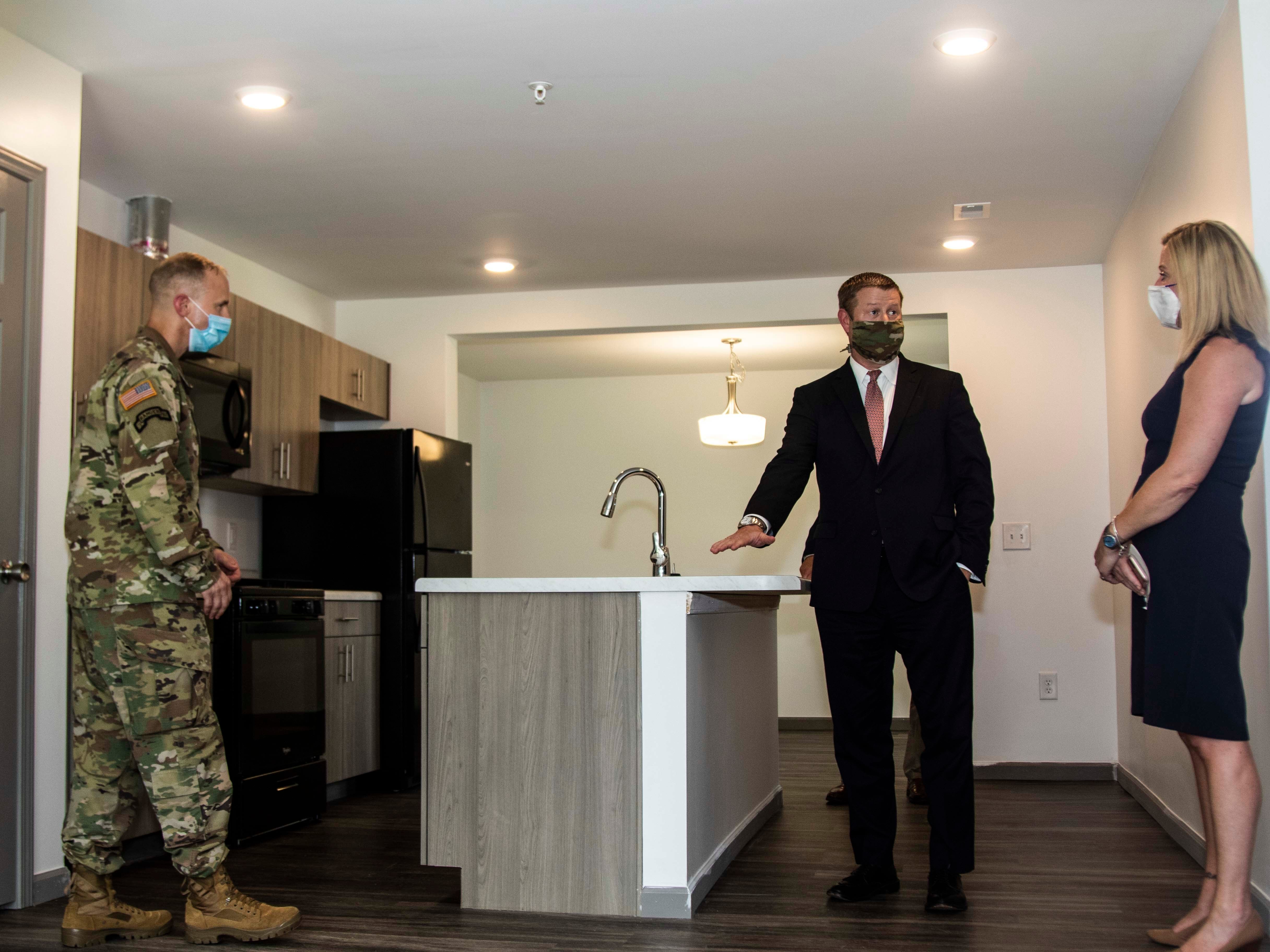Editor’s Note: This article was published as part of a content-sharing agreement between Army Times and The Fayetteville Observer.
Fort Liberty families who filed a lawsuit against affiliates of the installation’s private housing partner, Corvias, in June 2020 appear to be reaching a settlement, according to a federal judge’s order last month.
In the Sept. 20 order signed by Judge James Dever III, Dever said that the military families and Corvias’ affiliates met in a Sept. 19 settlement conference and told the court all parties will “file a stipulation of dismissal,” which means the court can dismiss the case on or before Nov. 30.
Details of the Sept. 19 settlement conference are not included in the court records.
“Nothing contained in this order shall be considered a dismissal or disposition of this action,” Dever wrote. “Upon the request of the parties, this case may be re-opened.”
The complaint
The original military families who filed the suit against Corvias are Staff Sgt. Shane Page and his wife, Brittany; Spc. Spenser Ganske and his wife, Emily; Sgt. 1st Class Christopher Wilkes and his wife, Ashley; and Cpl. Timothy Murphy and his wife, Katelyn.
According to an August 2022 motion, Timothy Murphy died, and his wife, Katelyn Murphy, was named as a personal representative of his estate in addition to also being part of the lawsuit on her own behalf.
An amended motion filed in November on behalf of the military families added Staff Sgt. Omar Bonilla Martinez and his wife, former Corvias employee Emiline Bonilla, to the complaint.
According to the latest September motion, Staff Sgt. Ezra Thomas and his wife, Rachel, also filed a separate complaint against Corvias on behalf of themselves and their two children in June 2022.
The Thomases also participated in the Sept. 19 settlement conference.
The suits are filed against Bragg Communities LLC and Corvias Management-Army LLC, which are affiliates of Corvias.
A June 27 amended complaint filed on behalf of the five military families from the June 2020 lawsuit alleges that the defendants “conspired to conceal harmful environmental and structural housing defects from unsuspecting service members and their families and failed to comply with applicable building and housing codes.”
The complaint further alleged that the defendants “knowingly leased substandard homes,” while “charging grossly excessive rents.”
“Defendants’ culture of concealment was driven by corporate greed where financial gains were maximized to the detriment of military families and their children,” the complaint alleged.
The complaint stated that all the families moved into homes “filled with mold, lead-based paint, structural wood rot and overall disrepair,” and that the defendants failed to inform the families the homes “lacked effective moisture and air barriers between exterior cladding and wall cavities.”
The defense
In a July response to the allegations, attorneys for the Corvias affiliates either denied all the allegations or said they had no knowledge of specific alleged conversations such as contractors showing or telling families they found mold in the homes.
While the military families sought relief for allegations of breaches of warranty and contract, negligence and violation of the Residential Lead-based Paint Hazard Reduction Act and to be awarded an unspecified restitution amount, attorneys for the Corvias affiliates argued that the military families’ damages are “too speculative.”
“Plaintiffs failed to take reasonable steps to prevent or minimize or otherwise to mitigate the damages they allege to have sustained,” court records stated. “Defendants’ actions were done in good faith, without malice and without intent, such that the relief sought is not available.”
The motion filed on behalf of the defense also stated that claims or alleged injuries and damages “caused by the acts or omissions of third parties” that the defendants “had no control” over absolves them of legal responsibility.
“The injuries suffered by plaintiffs, if any, were attributable in whole or in part to plaintiffs’ own contributory negligence,” the motion stated. “Defendants did not breach any applicable standard of care.”

What Corvias founder says
In an April motion, the military families sought to obtain a testimony from Corvias founder John Picerne.
In a May 10 motion, attorneys for Corvias said that the military families already had depositions from senior executives of Bragg Communities LLC, the lessor of the homes, and Corvias Management-Army LLC, the property manager.
Attorneys argued that Picerne is not a party in the lawsuit and “had no role in defendants’ day-to-day operations on Fort Bragg,” which has since been redesignated as Fort Liberty.
The attorneys said that while Picerne gave a 2019 congressional testimony about the Military Housing Privatization Initiative, the proceedings were not about specific housing conditions or issues “related to any particular installation.”
Heath Burleson, the then-senior vice president assigned to Bragg Communities with responsibility for Fort Bragg, as the representative for the Corvias Group affiliates, provided a 2020 congressional testimony and also provided a deposition for the lawsuit, attorneys said.
“A deposition of Mr. Picerne on the same topics would be duplicative, wasteful, and harassing,” the motion stated.
The motion stated that Picerne “has no unique relevant personal knowledge about Fort Bragg.”
In a statement given to Corvias attorneys, Picerne said he does not have unique personal knowledge about the facts, allegations or issues in the military families’ lawsuit.
“I do not know the plaintiffs personally, have never met them, have never communicated with — or about — any of them to my knowledge, and have no personal knowledge about the homes they leased while residing at Fort Bragg,” Picerne said.
He reiterated that as founder of the parent company, he does not handle day-to-day operations at any military installation.
In an Aug. 22 order signed by Judge Robert B. Jones Jr., Jones agreed that having Picerne’s testimony is “disproportional to the needs of the case,” and “the proposed discovery outweighs its likely benefit.”




